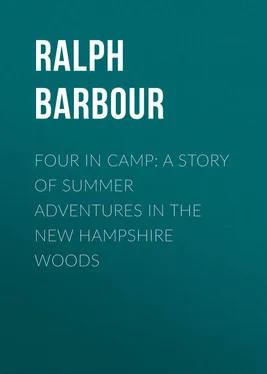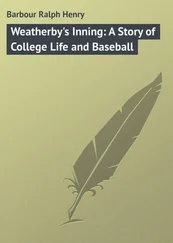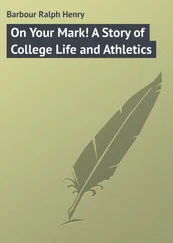Ralph Barbour - Four in Camp - A Story of Summer Adventures in the New Hampshire Woods
Здесь есть возможность читать онлайн «Ralph Barbour - Four in Camp - A Story of Summer Adventures in the New Hampshire Woods» — ознакомительный отрывок электронной книги совершенно бесплатно, а после прочтения отрывка купить полную версию. В некоторых случаях можно слушать аудио, скачать через торрент в формате fb2 и присутствует краткое содержание. ISBN: , Жанр: foreign_prose, foreign_children, на английском языке. Описание произведения, (предисловие) а так же отзывы посетителей доступны на портале библиотеки ЛибКат.
- Название:Four in Camp: A Story of Summer Adventures in the New Hampshire Woods
- Автор:
- Жанр:
- Год:неизвестен
- ISBN:http://www.gutenberg.org/ebooks/50590
- Рейтинг книги:5 / 5. Голосов: 1
-
Избранное:Добавить в избранное
- Отзывы:
-
Ваша оценка:
- 100
- 1
- 2
- 3
- 4
- 5
Four in Camp: A Story of Summer Adventures in the New Hampshire Woods: краткое содержание, описание и аннотация
Предлагаем к чтению аннотацию, описание, краткое содержание или предисловие (зависит от того, что написал сам автор книги «Four in Camp: A Story of Summer Adventures in the New Hampshire Woods»). Если вы не нашли необходимую информацию о книге — напишите в комментариях, мы постараемся отыскать её.
Four in Camp: A Story of Summer Adventures in the New Hampshire Woods — читать онлайн ознакомительный отрывок
Ниже представлен текст книги, разбитый по страницам. Система сохранения места последней прочитанной страницы, позволяет с удобством читать онлайн бесплатно книгу «Four in Camp: A Story of Summer Adventures in the New Hampshire Woods», без необходимости каждый раз заново искать на чём Вы остановились. Поставьте закладку, и сможете в любой момент перейти на страницу, на которой закончили чтение.
Интервал:
Закладка:
Four in Camp: A Story of Summer Adventures in the New Hampshire Woods
CHAPTER I
INTRODUCES NELSON TILFORD, AND WITNESSES HIS ARRIVAL AT CAMP CHICORA
“That’s Chicora over there.”
The man at the wheel turned to the boy standing beside him and nodded his head at a landing toward which the nose of the big steam-launch was slowly turning. It lay less than an eighth of a mile away across the smooth waters of the lake, a good-sized wharf, a float, a pole from which a blue-and-gray flag hung lifeless, and a flotilla of various kinds of boats. Several figures stood upon the pier, and their voices came shrill and clear across the intervening space. From the shore, which here circled inward into a tiny cove, the hill swept up rather abruptly for three hundred feet or more, and a third of the way up the gleam of unpainted boards through the trees told Nelson Tilford of the location of the camp which was to be his home for the next two months. It was a pleasant, peaceful scene before him, but the shadow of the hill had already crept well into the lake, leaving the shore and wooded slope in twilight, and a slight qualm of loneliness stole over him for the instant.
He had left the Boston express at Warder, six miles away, at half past four, and had been rattled over a constantly turning road behind a pair of stout horses to Chicora Landing, where, followed by his trunk, he had boarded one of the several small steam-boats which lay at intervals up and down the long shed like horses in their stalls. A half a mile at slow speed through a winding river, scarcely wide enough in places for the boat to scrape through between the low banks, had brought them into Little Chicora, hardly more than a pond. Another and far shorter stretch of river followed, and then, with a warning blast, the steam-launch had thrust her bow into the broad waters of the big lake, spread out like a great mirror in the evening sunlight, dotted here and there with well-wooded islands, and guarded by gently rising hills covered with maples, pines, white and black birches, poplars, and many other trees whose names Nelson did not know. White farmhouses gleamed now and then from the shores, and slender purple ribbons of smoke, rising straight into the calm evening air, told of other dwellings, unseen for the thick foliage. They had made three stops on the south side of the lake, first at Chicora Inn Landing, from where the big hotel was plainly visible a quarter of a mile away, then at Squirrel Island and Plum Island. Nelson had been interested all the way, for he had never seen a New Hampshire lake before, and the glimpses he had obtained of the comfortable summer camps and their healthy, sun-browned inhabitants had pleased him hugely. But when Plum Island had been left behind and the boat had entered the shadowed margin of the lake his spirits began to sink. The water and the dim woods looked cold and inhospitable to the city-bred lad. He wondered what the fellows of Camp Chicora would be like, and wished that he had joined at the beginning of the season instead of a fortnight after it. Now that it was past, that week at the beach with a school friend had not been especially enjoyable after all; and the rôle of the new boy was not, he knew from experience, at all comfortable. He almost wished he had held out against his father’s desires and stayed snugly at home.
His rueful thoughts were abruptly interrupted by a shrill blast of the launch’s whistle. They were close to the landing, and Nelson picked up his suit-case and climbed to the deck. The bell tinkled, the churn of the propeller ceased, and the boat sidled up to the pier. Nelson stepped ashore into a group of half-a-dozen fellows and set his bag down, prepared to lend a hand to the landing of his trunk. But some one was before him, a man of twenty-three or four, who, when the trunk was safely ashore, turned to Nelson with outstretched hand and welcoming smile.
“This is Nelson Tilford, isn’t it?” he asked, as they shook hands. “Glad to see you. Mr. Clinton didn’t get your letter until this noon, so we couldn’t meet you at the station. Did you have any trouble finding your way to us?”
“No, sir,” said Nelson, “every one seemed to know all about the camp.”
“That’s good. Well, let’s go up.” He took Nelson’s suit-case, despite the latter’s remonstrances, and led the way along the pier to a well-worn path which wound up the hill. Nelson, sensible of the frankly curious regard of the other fellows, followed. A bugle sounded clear and musical from the camp, and Nelson’s companion turned and waited for him to range himself alongside. “There’s the first supper call, now,” he said. “I guess you’re a bit hungry, aren’t you? By the way, I’m Mr. Verder, one of the councilors. There are four of us besides Mr. Clinton. You’ll meet them when we get up there. The Chief’s away this evening, but he’ll be back in time for camp-fire. We’re going to put you in Maple Hall, where the seniors bunk. That’s where I am, so if you want anything to-night don’t hesitate to ask me.”
“Thank you,” answered Nelson gratefully. His companion chatted on while they climbed the path, which led by easy stages up the hill through a thin woods, and Nelson forgot his previous misgivings. If the fellows were as jolly as Mr. Verder, he reflected, he was pretty sure to get on. The man beside him seemed scarcely more than a big boy, and his sun-burned face was good to look at. He was dressed in a gray jersey bearing a blue C on the breast, gray trousers with a blue stripe down the seam, and brown canvas shoes. He wore no cap, and the warm tan extended well up into the somewhat curly hair. His arms were bare to the shoulders. Nelson concluded he was going to like Mr. Verder; he looked strong, alert, good-humored, and a gentleman.
Two minutes of up-hill work on the winding path brought them to the clearing. The five buildings were arranged in what was practically a semicircle facing the end of the path. Back of them on all sides rose the forest. In the clearing a few trees had been allowed to remain, spruce in most cases, and one tall sentinel, shorn closely of its branches, and standing guard at the head of the path to the lake, had become a flagpole from which, as Nelson came into sight, the Stars and Stripes was being lowered, its place to be taken by a lighted lantern. Boys were coming and going between the buildings, or were scattered in little groups at the doorways.
Near at hand, by the entrance of Birch Hall, a knot of three men were standing, and to them Nelson was conducted and introduced. There was Mr. Ellery, almost middle-aged, slight, rather frail-looking; Mr. Thorpe, small, rotund, jovial, with twinkling blue eyes; and Mr. Smith, just out of college, nervous-looking, with black hair and black eyes, the latter snapping behind a pair of gold-rimmed glasses. It was difficult to stand in awe of persons attired negligently in shirt and trousers alone; and, anyway, none of the four councilors seemed at all desirous of impressing the newcomer with their dignity or authority. They were a sunburned, clear-eyed lot, troubling themselves very little with such things, but brimming over with kindly good-nature. After the greetings Nelson was hurried away by Mr. Verder to the wash-room, from whence, having hastily splashed his face and hands with water from a tin basin, he was hustled to the dining-hall, just as the bugle was blaring the last call to supper and the hungry denizens of the camp were crowding and jostling into the building. Nelson followed Mr. Verder, stood while Mr. Ellery asked grace, and then pulled out his stool and took his place at table. Mr. Verder, who sat at the head of the table, was beside him. There were three other tables in the room, and all were filled.
Читать дальшеИнтервал:
Закладка:
Похожие книги на «Four in Camp: A Story of Summer Adventures in the New Hampshire Woods»
Представляем Вашему вниманию похожие книги на «Four in Camp: A Story of Summer Adventures in the New Hampshire Woods» списком для выбора. Мы отобрали схожую по названию и смыслу литературу в надежде предоставить читателям больше вариантов отыскать новые, интересные, ещё непрочитанные произведения.
Обсуждение, отзывы о книге «Four in Camp: A Story of Summer Adventures in the New Hampshire Woods» и просто собственные мнения читателей. Оставьте ваши комментарии, напишите, что Вы думаете о произведении, его смысле или главных героях. Укажите что конкретно понравилось, а что нет, и почему Вы так считаете.












